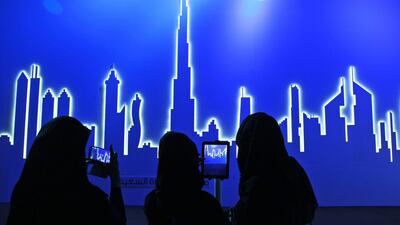One concept that has captured the world of technology this year has been the smart city.
Most governments in the world, and particularly those in the region, have prioritised the use of technology and telecommunications in construction and development projects to build sustainable and economic cities for the future.
Spurred on by Dubai’s 2020 Expo win, the move towards automating and digitising everyday processes and providing a sustainable environment to live in has become the priority of the UAE Government.
“Smartness of the city is reflected in its livability, efficiency and sustainability. And obviously, sustainability means economically sustainable,” says Mazen Zein, the director of strategy and business development, and the head of smart cities at Schneider Electric. “Making a city smarter means improving different city building blocks – infrastructure, environment, city services and others, while being economically sustainable. The innovative business model and economics are the key factor of success for reaching a Smart City.”
It is also a world in which health care will become more accessible to all. Smart cities will embody smart living and lifestyles in which people will be better informed about the impact of their choices. From smart rest rooms that analyse the contents of one’s urine to determine the level of dehydration to contact lenses that determine insulin levels in diabetics, the smart future is set to provide more choice for residents.
The GCC region, thanks to robust mobile internet infrastructure and continued roll-out of long-term evolution (LTE), is one of the few places in the world where the vision of the smart city is a viable future. Many government services are already automated, from paying electricity bills to smart lighting.
Pricing, however, still remains unclear. While services such as smart parking or even smart curtains and smoke alarms are slowly coming to the market, the way things will be priced is likely to change in the future, as mobile operators will look to cash in on the plethora of services that will use their networks.
Most of these services will be available to access through smartphones, which this year continue to grow in size and decrease in price. What were introduced to the industry as phablets – a portmanteau of phone and tablet – a couple of years ago are now known simply as phones. Even Apple, a company reluctant to offer more than a couple of different phones a year, joined the trend with the launch of the iPhone 6 Plus, which sold 10 million together with the smaller iPhone 6 in its first week.
Another first for the US-based manufacturer was its foray into wearable technology, paying heed to the trend that its competitors began to bank on a couple of years ago. Wearable technology has not ventured too far from the fitness aspect, but with Apple’s foot firmly in this space, uses and applications will multiply.
While the high-end, premium brands such as Apple and Samsung continued to lead in smartphone sales, the biggest inroad was made by the mid-priced manufacturers, mostly from China. The likes of Huawei, Oppo and the Indian brand Obi, the brainchild of the former Apple chief executive, John Sculley, all launched smartphones this year boasting high-end features with low-end prices.
And they have managed to succeed. Huawei’s market share has grown to about 7 per cent, taking share from the mid-market players such as Sony, which decided to launch the world’s first underwater store just off the World Islands in Dubai to demonstrate the waterproof capabilities of its devices. The concept store will now probably be replicated around the world.
While this PR stunt was a success for the Japanese company, its business has not been so lucky elsewhere. One of the largest and politically charged hacking scandals followed the release of its trailer for the film The Interview, which mocks the North Korean leader Kim Jong-un. The attack on the company was seen as an attack on the United States, and even the US president Barack Obama took to the podium to urge cinemas to go ahead and screen the film despite outrage from the communist country.
Perhaps, the biggest hacking scandal of this year was the Apple iCloud saga, in which intimate pictures of leading celebrities leaked online. Apple denied its servers had been hacked into, claiming the hackers had obtained the women’s passwords and urged its users to employ more robust security.
Closer to home, Etisalat saw its website taken down on December 18 in what is known as a domain name system cache poisoning attack. Users were redirected to a Chinese site.
“For as long as the false entry is cached, incoming Web requests and emails will go to the attacker’s address,” says Cherif Sleiman, the general manager of the Middle East at Infoblox. “There are two possible motivations behind these attacks. The first is the pure joy of proving that a high-profile organisation, in this case Etisalat, is vulnerable and their systems can be compromised. And the second is malicious intent for financial gain.”
While such attacks are still relatively few and far between, it presents a troubling time ahead since things are becoming more converged, more connected and in turn more vulnerable. As more data moves to the cloud, it becomes more centralised, leaving a whole host of sensitive information – not just pictures and emails, but medical records and daily habits – at risk.
“Concerns about privacy hold the industry back, but they are legitimate concerns” says John Swainson, the president of software at Dell. “The industry has not done a great job with explaining what it does, and even when it does explain, it doesn’t give people the option to opt out.”
Such concerns will continue into the new year and manufacturers and developers will come under increasing pressure to be more transparent about user data and their privacy.
thamid@thenational.ae

